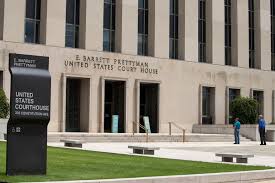
Trump Administration has been a fertile source of litigation. With the election only about three months away, this seems like a good time to see how things stand in climate-related case. In a nutshell, climate litigation has been a growth industry under Trump, and the Administration has done poorly in court.
The Current State of Play
Types of Lawsuits
The Sabin Center at Columbia maintains a database of U.S. climate litigation, which gives an overall sense of what types of cases are being brought. The biggest category consists of lawsuits based on federal statutes. Within that category, the most frequent types of litigation involves environmental impact statements, the Clean Air Act, and endangered species. The large number of filings relating to environmental impact statements was something of a surprise to me. State court litigation comes next. About two-thirds of those cases involve state requirements for environmental impact statements, like California’s CEQA.
Then there are a scattering of other cases. The cases that have gotten the most public attention fall into this “other” category. The case with the highest profile is Juliani, the “childrens’ lawsuit.” This case, brought on behalf of a group of young people, argued that the federal government’s encouragement of fossil fuels and inaction on climate change violated the public trust doctrine and the Constitution. A three-judge panel on the Ninth Circuit expressed considerable sympathy with these claims, but the two-judge majority ordered the case dismissed for lack of standing. The majority’s theory was that any possible remedy would violate the separation of powers by requiring courts to make broad federal policy decisions. The plaintiffs are seeking review by the entire Ninth Circuit, but the prospects don’t appear good.
The other prominent cases in the “other” category involve claims against oil companies. Beginning with some California counties and cities, several jurisdictions have brought suit in state court against the oil companies. The lawsuits claim that the carbon emissions linked to oil use are a public nuisance. The jurisdictions seek to recover damages for the extra costs of sea walls and other measures for adapting to climate change. The oil companies have tried to move these cases to federal court, where judges on average are more conservative. So far, those efforts have been unsuccessful. So it looks like those cases will move forward in state court. The plaintiffs still face serious barriers there, including questions about jurisdiction over out-of-state oil companies.
Other cases have been brought by state attorney generals against oil companies. The state AGs argue that the companies have committed fraud by misleading the public about climate change. So far, these suits haven’t been successful, but that could change.
Trump’s Rollbacks in Court
In practical terms, the most important litigation has involved regulation of carbon-emitting activities by federal agencies. In the Massachusetts v. EPA, Justice Stevens’s pioneering opinion held that the state had standing to sue EPA over climate change and that EPA had jurisdiction to regulate carbon emissions. The result was a swath of regulations by EPA under Obama, followed by energetic rollback actions by the Trump Administration. The fate of these rollbacks hinges in part on litigation and in part on the next election.
Harvard’s Environmental and Energy Law Program maintains a database of Trump’s environmental rollbacks. I counted about fourteen rulemakings “in process” that involved fossil fuels, including EPA cases, regulations of oil and gas production, and so forth. The Trump Administration will be trying to wrap up these “in process” regulations before January in case the election goes against them. There are another eight rules listed as “in process, in litigation,” basically meaning cases that were litigated and returned to the agencies. Finally, there are ten rules currently in litigation. Clearly the Administration was prioritizing those ten rules rules. They involve major “repeal and replace” efforts, involving Obama’s regulations for power plants, new cars, fracking, and mercury emissions from coal-plants.
How well has the Trump Administration been doing on litigation? Here we turn to another tracker, this one from NYU’s Institute for Policy Integrity. The NYU tracker shows that the Administration has won only 12% of lawsuits. This is a really miserable record, considering that courts are supposed to defer to reasonable agency decisions. Early in the administration, many of the losses involved failure to follow basic rule making procedures (giving public notice and receiving comments). Surprisingly, the Administration has continued its efforts to shortcut those procedures even after frequent smackdowns in court.
Other Trump rules have been overturned as arbitrary and capricious. That means that the agency failed to do its homework and didn’t come up with supporting evidence or arguments for its actions. Courts have recently received some Supreme Court encouragement to take a hard look at agency actions in the recent DACA case. There were also a number of judicial reversals because the Administration botched environmental impact statements. In short, the Trump Administration has been extremely sloppy and has paid the price in court.
What’s Next?
Regardless of who wins the White House, environmental group and sympathetic state officials will continue to press forward in state courts. What happens to federal litigation, however, may completely depend on the election.
If Trump wins in November, federal litigation against its rules will move forward. If Trump loses, things become more complicated. Rules that were completed after May (and perhaps a bit earlier) will be subject to the Congressional Review Act. That’s a fast-track procedure for overturning rules that the Republicans used with success after Trump won. It may be turned back against them next year if the Democrats flip the Senate as well as the White House. The Biden Administration will probably ask reviewing courts to put many other suits on hold so that agencies can reconsider their positions. It may also switch sides in some cases, asking the court to invalidate a Trump-era rule or stay its effectiveness.
A Biden presidency might also see some switches in legal positions. It would be Biden and environmentalists, rather than Trump and conservatives, arguing against nationwide injunctions and seeking help from the Supreme Court to lift them. It would also be Biden rather than Trump arguing for the power of new Presidents to change policies. Don’t be surprised if legal commentators experience a bit of whiplash.
Obviously, it’s totally premature to scope out how litigation would change under Biden. He’s ahead in the polls now, but the election is still over three months away. We seem to be living in “dog years” these days, with every normal month feeling like seven months. So three months is a very long time right now, and a lot could happen between now and November 3.
The post Climate Litigation 2020 appeared first on Legal Planet.
By: Dan Farber
Title: Climate Litigation 2020
Sourced From: legal-planet.org/2020/07/23/climate-litigation-2020/
Published Date: Thu, 23 Jul 2020 14:29:02 +0000
Vist Maida on Social Me
Website Links
Maida Law Firm - Auto Accident Attorneys of Houston, by fuseology

No comments:
Post a Comment